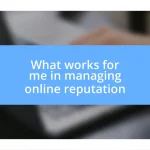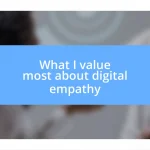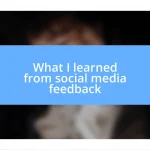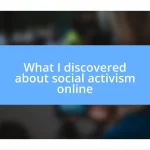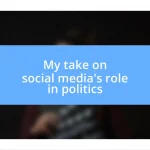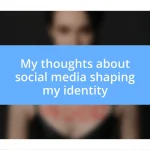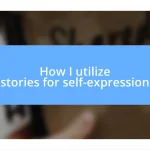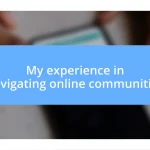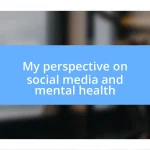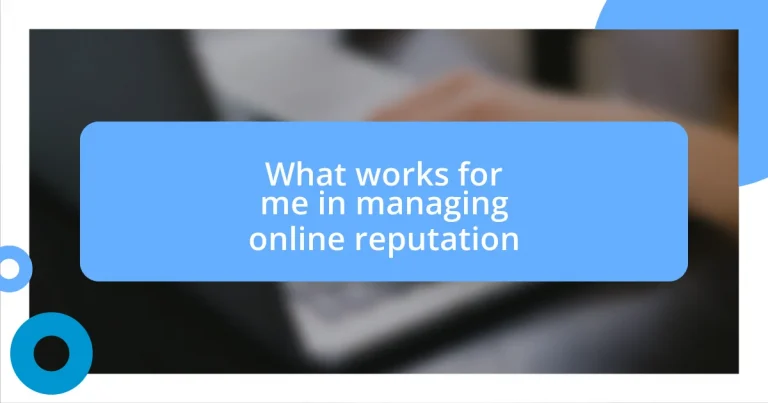Key takeaways:
- Online reputation management (ORM) involves actively shaping and monitoring one’s digital persona through engagement and authenticity.
- Personal branding is essential for building trust, attracting opportunities, differentiating oneself, and controlling one’s narrative in a competitive landscape.
- Effective engagement with the audience includes authentic interactions, participation in community discussions, and leveraging storytelling to foster deeper connections.
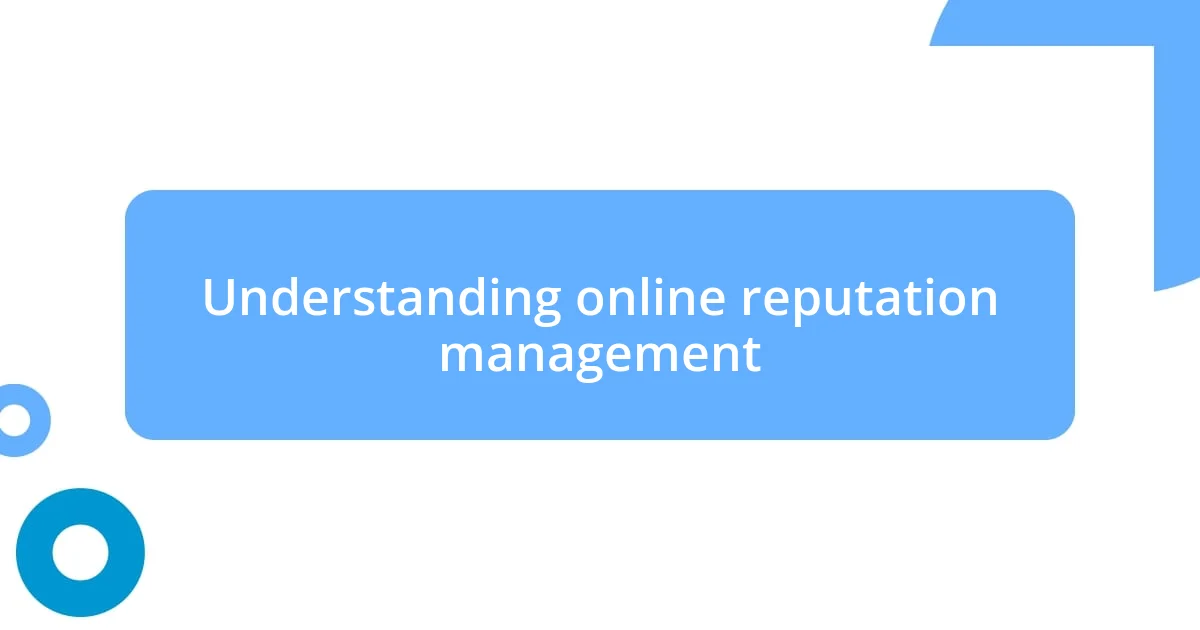
Understanding online reputation management
Online reputation management (ORM) is essentially about how we control our presence on the internet. I remember when I first realized the power of a single tweet; it left me questioning, “What happens when someone doesn’t like my perspective?” That moment underscored the importance of being mindful of what I share and how it reflects my values.
ORM involves actively monitoring and influencing the way people perceive you online. I’ve often found myself googling my name to see what comes up, a habit I developed after discovering that outdated information could easily overshadow my accomplishments. Have you ever done that? It’s a revealing experience, sparking a sense of urgency in shaping my narrative.
Managing your online reputation isn’t just a behind-the-scenes task; it’s a continuous journey of engagement and authenticity. When I choose to share genuine stories from my life, I find that it not only humanizes me but also builds trust with my audience. Isn’t it fascinating how our online persona can sometimes feel more real than our day-to-day interactions?
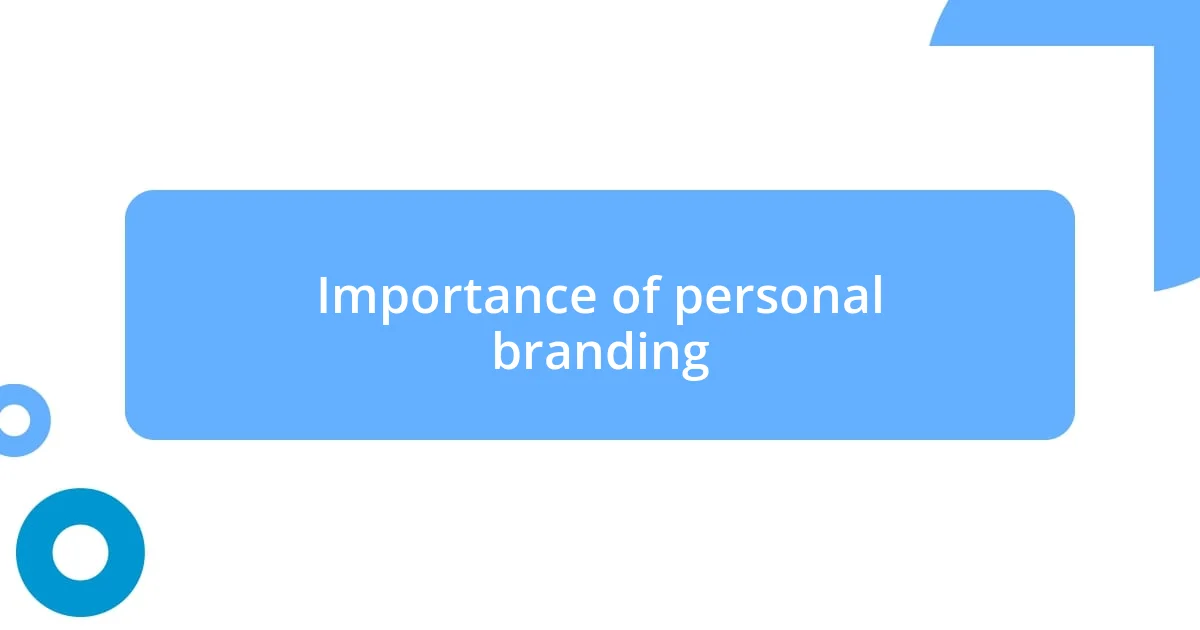
Importance of personal branding
Personal branding is crucial in today’s digital landscape, as it shapes how we’re perceived online. I recall an instance when I updated my LinkedIn profile to reflect my latest projects; the feedback from my peers was overwhelmingly positive and reaffirmed my expertise in the field. This experience taught me that every detail we put out there—whether it’s our photo, bio, or even the articles we share—conveys a message about who we are.
Here are a few key reasons why personal branding matters:
- Trust Building: A well-crafted personal brand fosters trust among your audience, making them more likely to connect with you.
- Opportunity Attraction: Strong personal branding can open doors to job offers, collaborations, and networking that aligns with your goals.
- Differentiation: In a competitive market, a unique personal brand sets you apart from others, showcasing your unique qualities and values.
- Control of Narrative: Crafting your personal brand allows you to tell your own story, rather than leaving it up to others to define you.
- Longevity in Career: Consistently nurturing your brand can result in sustained recognition and respect in your industry over time.
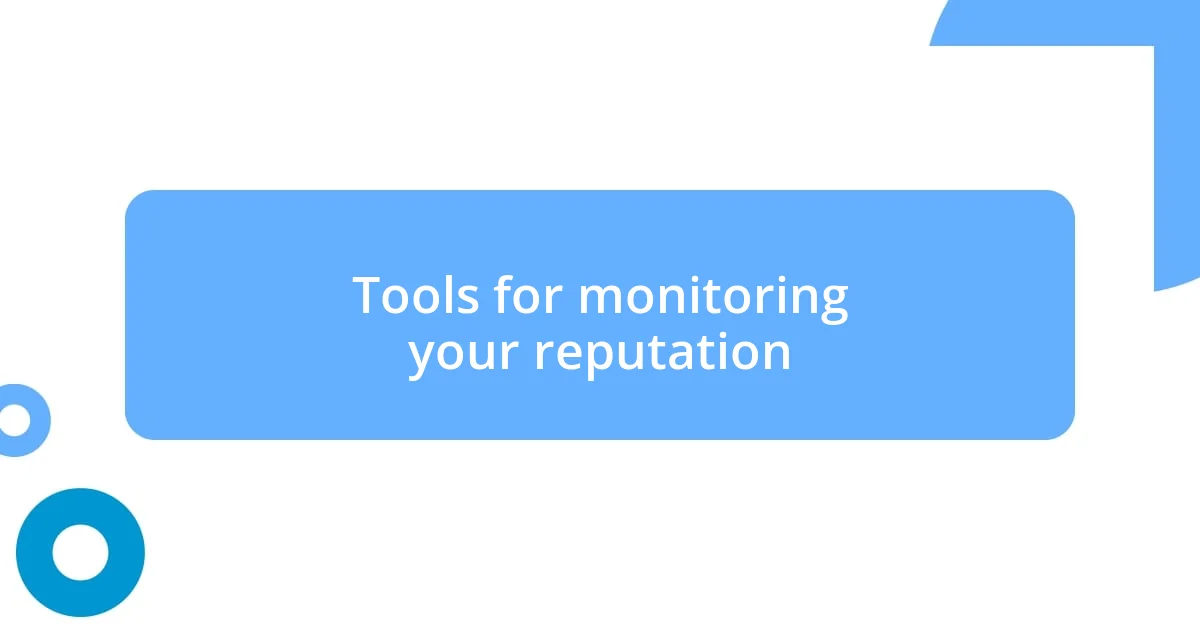
Tools for monitoring your reputation
Monitoring your online reputation effectively relies on the right tools. In my experience, using a combination of platforms can make a significant difference. Tools like Google Alerts notify me whenever my name appears online, while social media monitoring tools like Hootsuite allow me to track comments and mentions across various platforms. This proactive approach gives me peace of mind, knowing I’m always in the loop.
When I first started monitoring my reputation, it felt overwhelming. Fortunately, I discovered tools like BrandYourself, which helps with reputation cleanup by finding negative links and promoting positive content instead. Having that support made the process much more manageable. Another tool I often recommend is Mention, which provides real-time alerts and analytics for online mentions, helping me understand the sentiment around my name.
Here’s a comparison of some recommended tools that I’ve found useful over the years. Each has its strengths, so consider what best fits your needs.
| Tool | Key Features |
|---|---|
| Google Alerts | Real-time alerts for your name or keywords |
| Hootsuite | Social media monitoring and management |
| BrandYourself | Reputation management and cleanup |
| Mention | Real-time alerts and sentiment analysis |
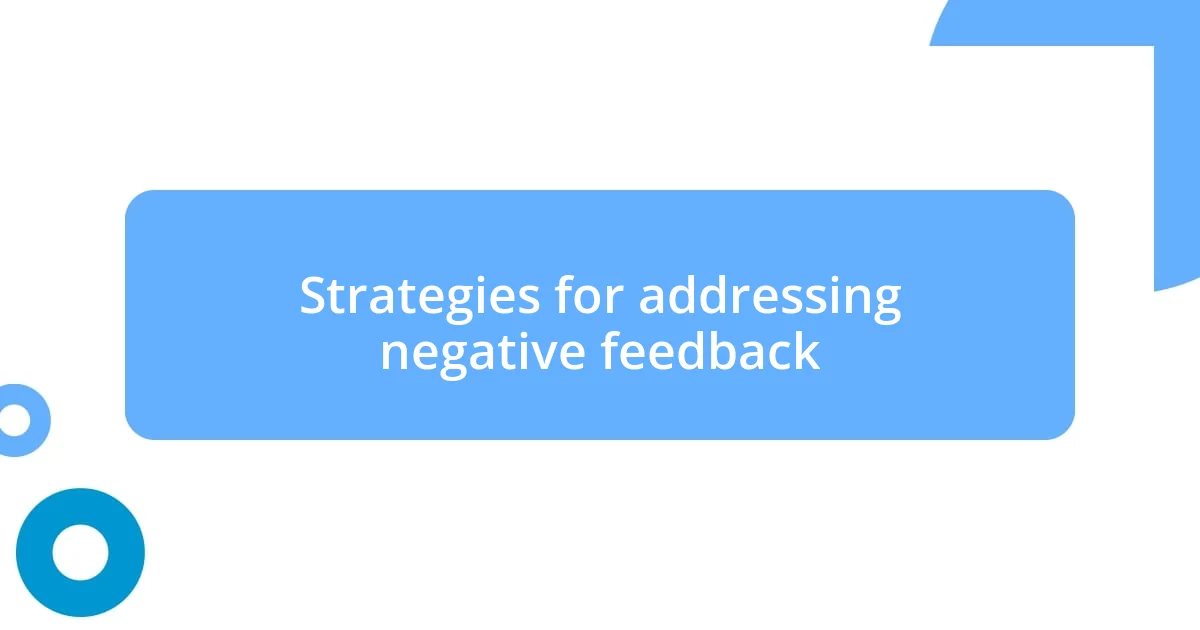
Strategies for addressing negative feedback
When it comes to addressing negative feedback, my approach is to respond promptly and professionally. I remember receiving a harsh review on an article I wrote. Instead of letting it upset me, I took a deep breath and crafted a thoughtful response, acknowledging the reviewer’s points and thanking them for their input. This not only diffused the situation but also showcased my commitment to improvement.
Seeking to understand the criticism is another crucial strategy. When I encounter negative comments, I often ask follow-up questions to clarify the sender’s concerns. This engagement not only shows that I value their perspective but also provides me with insights to fine-tune my work. Isn’t it fascinating how turning a critique into a valuable dialogue can actually strengthen connections?
Lastly, showcasing proactive measures can silence negativity before it spreads. After a particularly rough patch with feedback, I decided to share a blog post detailing my journey of growth and learning through mistakes. This outing not only transformed how I perceived those negative comments but also reframed my narrative to emphasize resilience and continuous improvement. Have you thought about how turning negatives into a narrative of growth can enhance your public image? It’s a strategy that has certainly helped me reclaim my voice online.
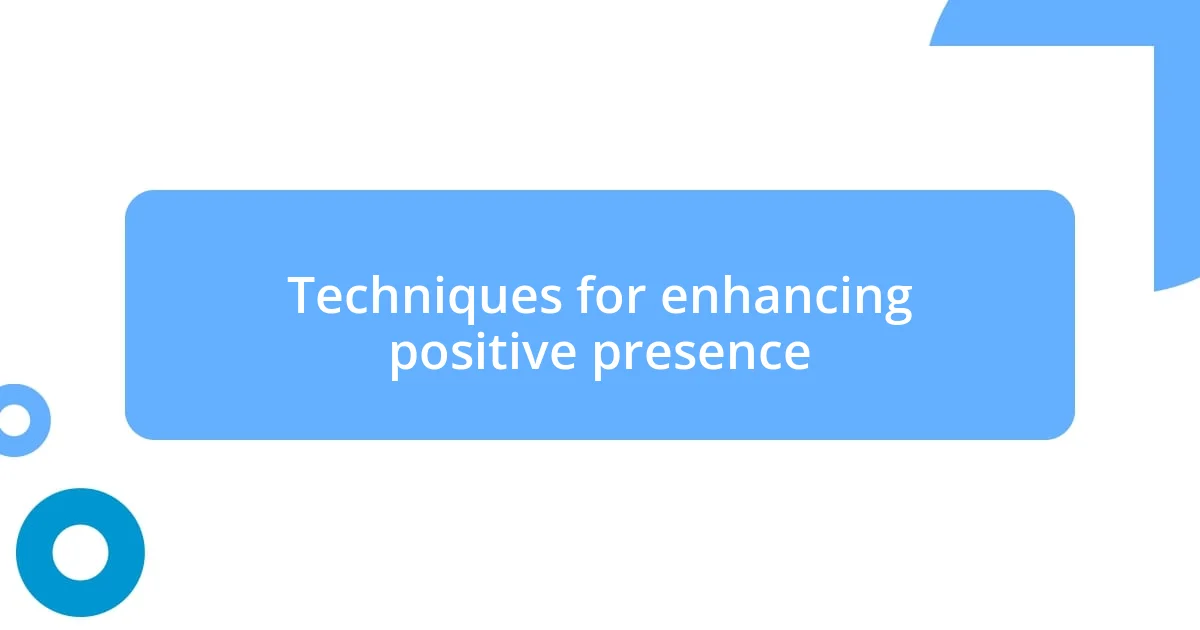
Techniques for enhancing positive presence
Engaging with your audience positively on social media is one of the most effective techniques I’ve found. For instance, sharing behind-the-scenes glimpses of my projects not only humanizes my brand but also creates a sense of connection with my followers. Have you ever noticed how people appreciate transparency? It fosters trust and makes them feel like they’re part of the journey.
Another method I cherish is consistent content creation. I make it a point to regularly share valuable insights—whether through blog posts, videos, or podcasts. This constant engagement keeps me relevant in the digital space and encourages discussions. I remember when I started a weekly Q&A segment; it transformed my relationship with my audience, creating a lively space for interaction and exchange. Have you considered what consistent presence could do for your online relationships?
Finally, showcasing positive testimonials can significantly enhance your online reputation. I always encourage clients to share their experiences with my services. Recently, I featured a touching testimonial from a client whose success story resonated deeply with my audience. It wasn’t just about the service I provided, but the way it positively impacted their life. How do you think sharing stories of transformation can elevate your presence online? It’s an integral part of building a narrative that highlights not only what I do, but why it matters.
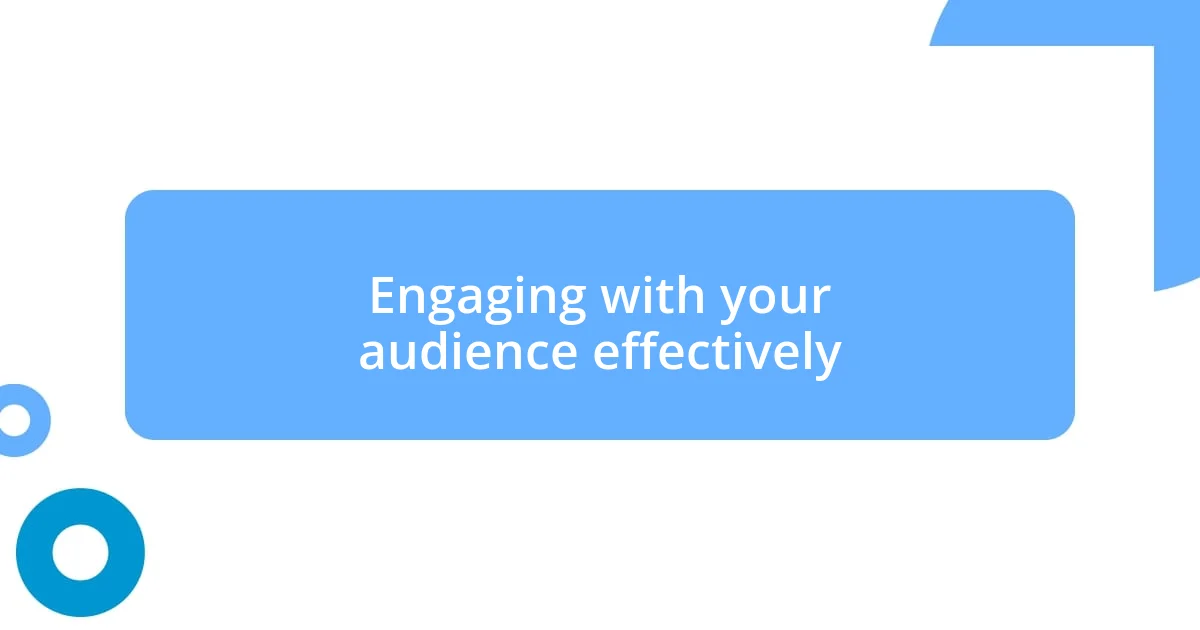
Engaging with your audience effectively
Engaging with your audience effectively often means prioritizing authentic interactions. I remember a time when I hosted a live chat session on social media, eager to connect directly with my followers. The energy was electric, and seeing their questions stream in felt like I was having a conversation with friends instead of fans. Have you ever participated in such a dialogue? It’s amazing how personal connections can transform a digital relationship into something much deeper.
Another avenue I’ve explored is actively participating in discussions within my community. I joined forums related to my niche, offering advice and insights from my experience. This effort not only showcased my expertise but also demonstrated that I truly care about my audience’s needs. How do you think showing up in spaces where your audience hangs out could enhance your interaction with them? I find that being genuinely present and responsive fosters a sense of loyalty that’s hard to break.
Lastly, leveraging storytelling has been a game-changer in how I engage with my audience. Sharing a personal story that relates to the challenges they face pulls them in and helps them see the human side of me. Recently, I narrated my journey through failure and eventual success, which resonated with many. Do you see the power of storytelling in building connections? The right story can turn a simple interaction into a memorable experience for both you and your audience.
